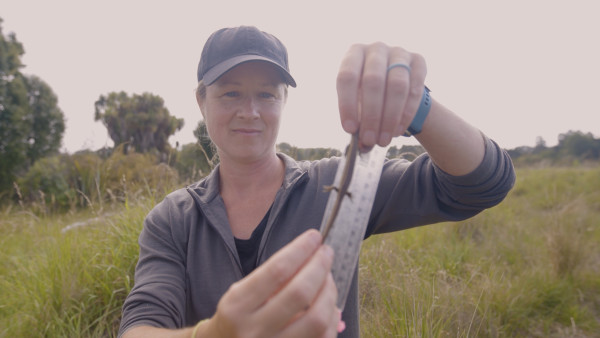Right on the tail of Christchurch’s lizards
Christchurch City Council Newsline: 25th March 2025
As the self-proclaimed ‘lizard lady’, Christchurch City Council Herpetologist Chris McClure’s job is not your average 9 to 5.
Chris’s day in the life of consists of relocating endangered lizards away from Council construction sites, keeping them out of harm’s way and promoting the species survival.
There are five species of lizards that like to live in Christchurch, with some hiding in greenfield and industrial areas, tucked away in shrubs or camouflaged in the residential red zone.
These locations often double as Council sites for vital infrastructure like stormwater basins, bridges and roads or development projects in the Port Hills and Ōtākaro Avon River Corridor (OARC). That’s where Chris steps in.
“We’re lucky enough to have the incredible lizard species that we do here in Christchurch, but these special guys need a lot of help,” Chris says.
“While some of these sites may look like the perfect lizard habitat, we want to give these endangered creatures a better chance at survival. And we can do that by taking them to safe relocation spots that are approved release areas.”
Chris’s work starts by completing a desktop survey with aerial maps of the soon-to-be construction sites, looking for areas of habitat she thinks the little creatures may be hiding in.
Once lizards have been confirmed at the site, she works with the Department of Conservation (DOC) to obtain a permit to handle and move lizards out of harm’s way.
 Chris is then deployed to the sites and sets traps to safely collect and relocate the lizards to Council relocation sites that can legally never be built on or damaged, providing a forever home for the endangered species.
Chris is then deployed to the sites and sets traps to safely collect and relocate the lizards to Council relocation sites that can legally never be built on or damaged, providing a forever home for the endangered species.
As all of New Zealand’s lizards are protected by the Wildlife Act 1953, the Council has a legal obligation to relocate any lizards identified of being at risk from future development works.
“We take care of them from then on, monitoring the site for a number of years to keep track of the populations to see how the little guys are surviving,” Chris says.
Chris says members of the public can help our lizard populations too, simply by reporting a sighting on the DOC website.
“Keep an eye out for lizards in the wild and if you come across one, pop through a record to the DOC.
“This helps us understand where lizards are located and what’s going on with their species, meaning we can better help them survive.”
Report a reptile sighting on the Department of Conservation website.